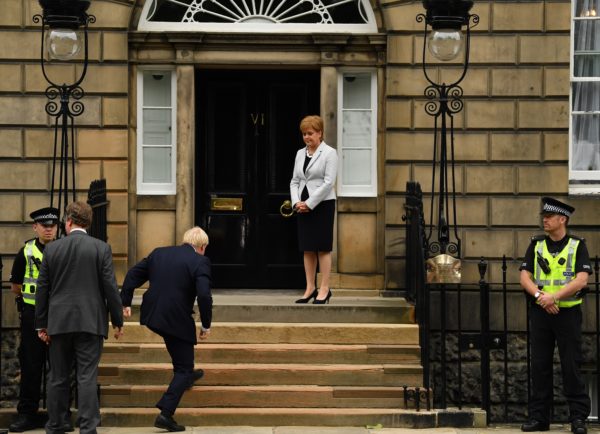Growing concerns Scottish powers will be ignored in post-Brexit trade negotiations
Holyrood fears Boris Johnson’s government will disregard devolved powers on food and environmental standards

Scottish politicians fear Boris Johnson’s government will ignore Holyrood’s devolved powers on food and environmental regulations to secure a post-Brexit trade deal with the United States.
Unearthed reported last week on a leaked briefing prepared for Environment Secretary Theresa Villiers which warned her ministry will come under “significant pressure” from the Department for International Trade (DIT), led by Liz Truss, to weaken the UK’s sanitary and phytosanitary standards (SPS) to secure a trade deal with the US.
SPS policy refers to regulations preventing products like hormone-fed beef and chlorinated chicken entering the UK. EU food and environmental regulations are generally stronger than those in the US, where food producers can get away with having small quantities of “extraneous materials”, including everything from “rodent filth” to “insect fragments”, in their products. Ground nutmeg sold in the States is allowed to contain an “average of one or more rodent hairs per 10 grams”.
The leaked briefing warns that getting any trade deal is complicated by the fact that “much of SPS policy is devolved” to administrations in Scotland, Wales and Northern Ireland. That means that these bodies could scuttle any deal struck by the government in Westminster that leads to the UK’s food and environmental rules being undermined, if those devolved powers are respected.
‘Standoff’
Michael Keating, a professor of politics at the University of Aberdeen, said there has been a “standoff” on the issue of food standards between Holyrood and Westminster ever since the Brexit referendum in 2016.
“Food standards are devolved but they’re subject to EU regulation. When we leave the EU, the question is where those powers go back to,” he explained.
“Trade deals are reserved, while regulations are devolved. Does that mean that an international trade deal would cover the devolved administrations as well? If it has lower environmental standards, would that be binding on the administrations?”
Scottish National Party (SNP) MSP Derek Mackay, told Unearthed that Scottish and Welsh ministers raised the issue of food and environmental policy at a recent meeting with Defra.
Mackay said the SNP is determined to “protect Scotland’s interests in future trade deals” including food standards. He also pointed out that the party has called for the Scottish parliament to have “a guaranteed role in the development of any future trade arrangements”.
The EU also offers protected status for food products made in member states. Scottish politicians in particular are protective of the special status given to products like Scotch whiskey and Scottish smoked salmon. British farmers fear that trade deals with non-EU countries could force producers to compete with a flood of cheap food imports into the UK. The leaked document states that agreeing to reduce SPS standards would “reduce trust” in British exports.
The devolved administrations in Scotland and Wales are described in the document as holding strong views on hormone treatments and Genetically Modified (GM) crops.
Unearthed understands that the Scottish government has been alarmed by recent suggestions by Johnson that the UK will ditch EU rules on GM crops after Brexit.
The Prime Minister used his first speech in the House of Commons to call for the “liberation” of “the UK’s extraordinary bioscience sector from anti-GM rules.” He said: “Let’s develop the blight-resistant crops that will feed the world.”
There’s also a possibility that any move by Westminster to ignore Scottish powers on SPS could increase calls for a new independence referendum. Polls have shown rising support for a second referendum since Johnson came to power.
In response to our original story on the Defra briefing, spokesman for the department said it did not comment on leaked documents. He then stated: “The UK is a world leader on animal welfare and environmental standards, and this will only continue to improve after we have left the EU.”

